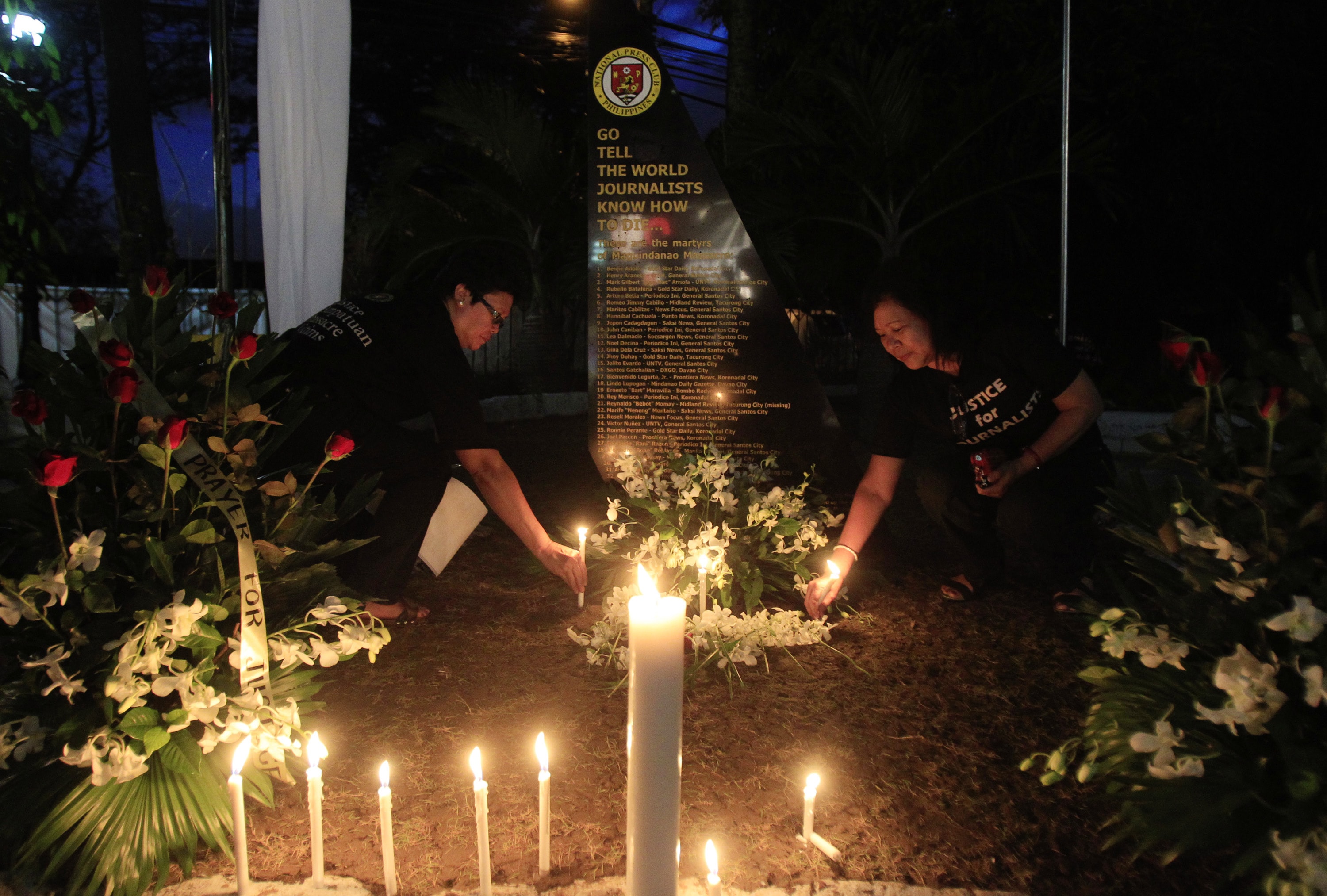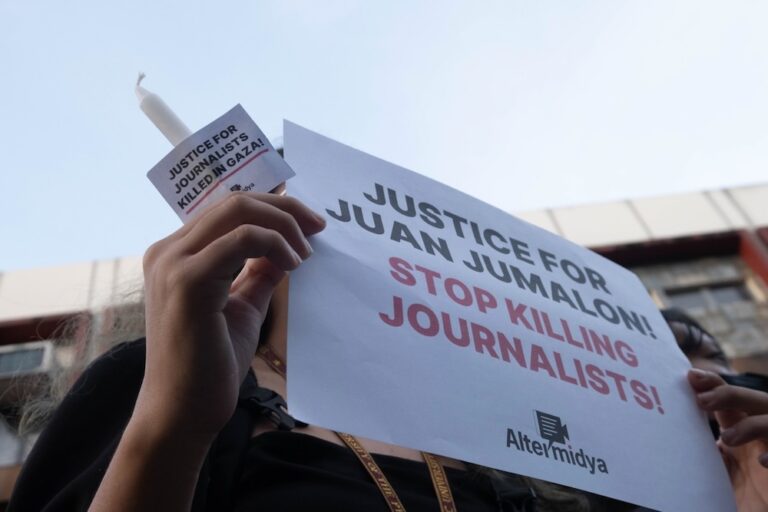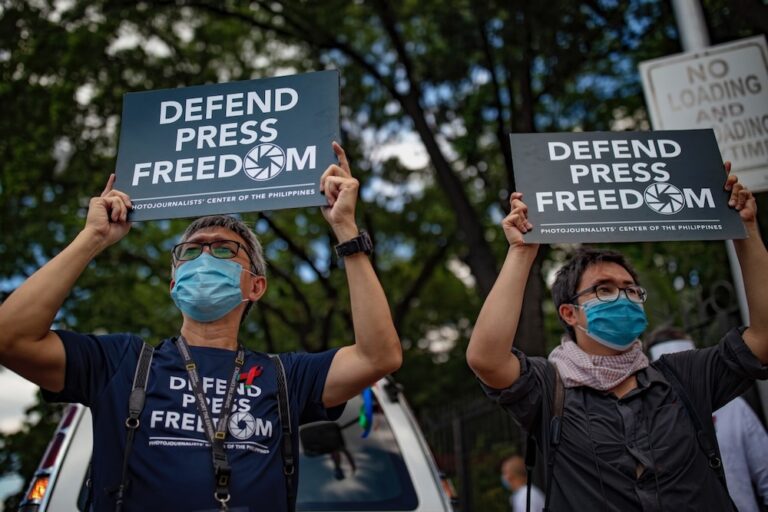Six years since 58 people, including 32 journalists and media workers, were murdered in the Philippines, IFEX members continue to call for justice.
23 November will mark 6 years since the 2009 Ampatuan massacre, which resulted in the death of 58 people, including 32 journalists and media workers. It is the single most deadly incident in the history of Philippine media according to the Manila-based Center for Media Freedom and Responsibility (CMFR).
IMAGE GALLERY
The shocking attack – which is also referred to as the Maguindanao massacre – took place prior to provincial elections in Ampatuan town, in the southern province of Maguindanao, Mindanao Island. The journalists were travelling with a convoy of relatives and supporters of local vice-mayor Esmael Mangudadatu, on their way to file papers for his gubernatorial candidacy. The convoy was intercepted by over 100 gunmen at a police checkpoint, and more than 50 people, including the wife and sister of the candidate and a number of journalists, were taken hostage. They were slaughtered and hastily buried in mass graves. The killings were allegedly carried out to prevent Mangudadatu from challenging the local governing family’s control of the province.
The sheer scale and horror of the incident shocked the international community. One week after the incident, 52 IFEX members came together to call on the Philippines to confront the country’s culture of impunity – a culture that had become worse under the then regime of President Arroyo. “An environment where violence and crime go unpunished, when the problem of impunity ‘festers’, results in such tragedies,” said the December 2009 joint action led by CMFR, and the Bangkok-based regional Southeast Asian Press Alliance (SEAPA).
A few days later, a coalition of media groups called for swift justice and outlined some of the elements necessary to ensure that the case would not remain unpunished – among them, the creation of a commission outside the government to investigate the crime; the formation of a special court to try the case; and fully guaranteed protection for the witnesses.
In February 2010 nearly 200 people were indicted in connection with the slaying. Significantly, the indictment charged the powerful local politician and political clan leader Andal Ampatuan Sr. and others of conspiring to ambush and kill members of the rival Mangudadatu family and supporters.
Despite this hopeful first step however, the case soon became mired by various postponements and motions filed by the defendants’ lawyers. Suspicions about political interference were voiced when charges were dropped against some of the accused or suspects remained at large months after the indictments. The question of whether vital information was being concealed from the public also came up as journalists faced challenges in covering the trial proceedings. Over the years witnesses to the massacre and their families came under attack or were offered large amounts of money to change their testimony. Seven individuals – four witnesses and three relatives of massacre victims – have been killed. The trial venue has been changed and prosecutors working on the case face threats regularly. A special section of CMFR’s website, the Ampatuan Trial Watch, provides updates on the ongoing trial of the Ampatuans and other accused.

Keeping the spotlight on the case
Despite the ongoing setbacks and the “glacial” pace of the proceedings, IFEX members have continued to advocate for justice in the case, supporting the efforts of their Philippine colleagues, carrying out fact-finding missions and meeting with officials of the Benigno Aquino III government, which came into power in 2010 after vowing justice for the victims in his presidential campaign. The ingrained culture of impunity not only denies justice to the victims of this case, IFEX members have said, but by sowing fear in Philippine society it also muzzles the media and promotes self-censorship.
Special occasions such as the 15-month or 1000th day after the massacre have also been marked by tributes to the victims. A special Million Candles Campaign was held in 2014 to mark the fifth anniversary. That same year, the International Federation of Journalists (IFJ) joined its affiliate the National Union of Journalists of the Philippines in an International Solidarity Mission to the Philippines. A special report entitled “Ampatuan Massacre: Five Years On” presented the findings of the mission and included a number of key recommendations to the Aquino government.
23 November has become a special day on IFEX’s calendar – it is an opportunity to honour the memory of those who were killed, to call for justice and boldly say “Never again”. Commemorations of this unfortunate anniversary gave birth to the IFEX network’s campaign against impunity, with a focus not only on the Philippines but everywhere perpetrators of crimes against journalists go unpunished.
Six years on – justice delayed is justice denied
Six years after the slaying, justice remains elusive as not a single suspect has been convicted. As the Committee to Protect Journalists (CPJ) reported, during his final State of the Nation Address on 27 July 2015, President Aquino made only a passing mention of the massacre. He did not detail any plans for action on the case, despite his vow to deliver justice before his term ends in 2016. And despite various missions to the country and recommendations submitted to the Aquino government, the IFJ has received no communication from the president.
Occasionally there is some movement forward – for example, just a few days ago on 17 November, the authorities apprehended a suspect. At the same time, the patriarch of the Ampatuan clan, one of the primary accused, will never be brought to trial. Andal Ampatuan Sr. had allegedly led the planning and the execution of the massacre. He died of liver failure at a hospital in Quezon City on 17 July.
To ensure that justice is served swiftly when attacks occur in the future, CMFR continues to advocate for a Quick Reaction Team composed of government officials, civil society and media representatives who can conduct fact-finding and reporting for prompt follow-up on incidents of killings. They also continue to press the Aquino government to take various steps to follow through on its commitments to find justice for the victims before the end of his term.
IFJ also has a number of concrete recommendations they continue to push for as part of their End Impunity campaign that stems from their international solidarity mission conducted in 2014. On this 23 November, IFJ Global will be presenting these findings and recommendations to the Philippines embassy in Brussels with a focus on witness protection, ending judicial corruption and other measures to ensure justice does not stall indefinitely.

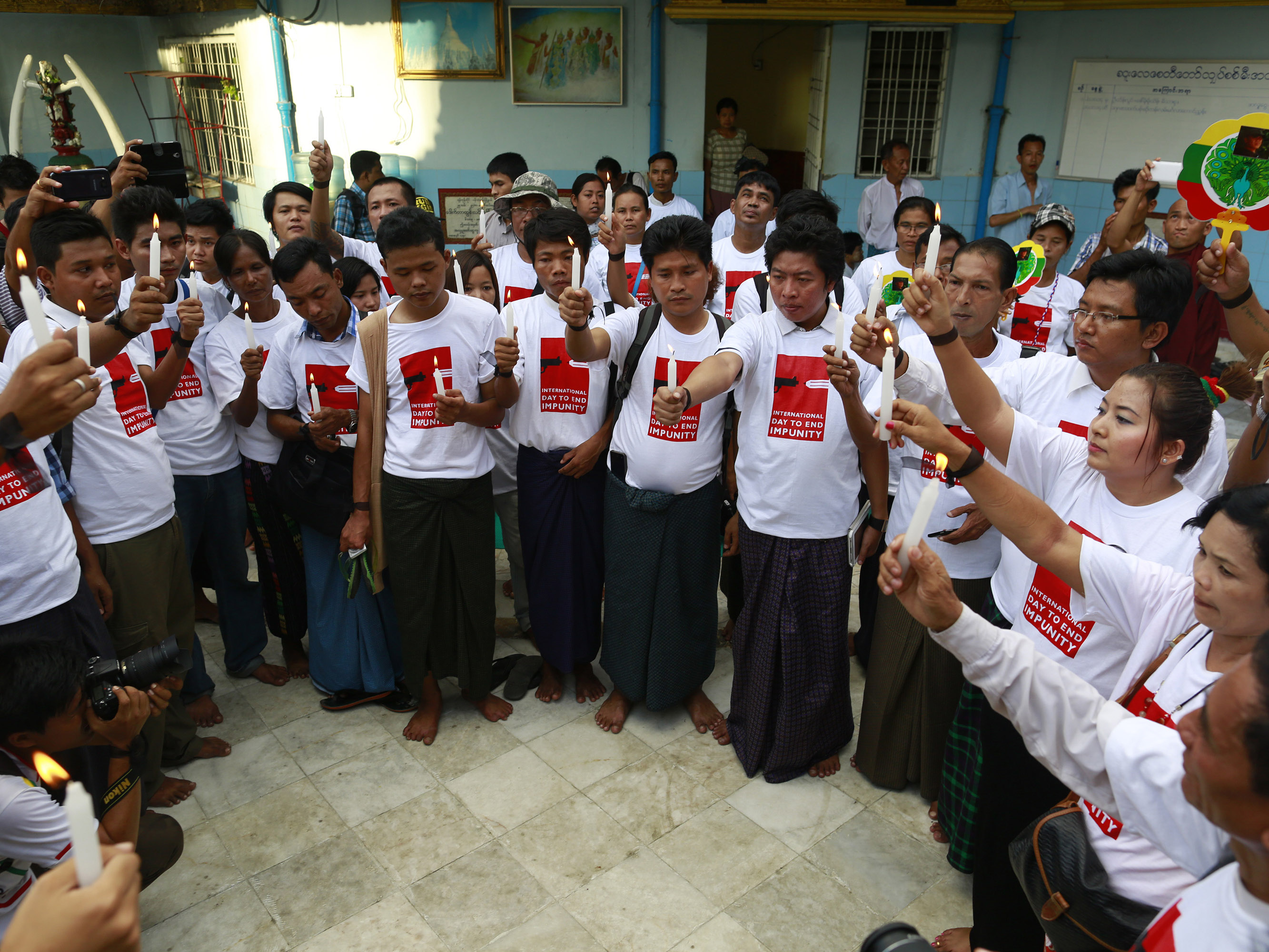
Journalists pray for their colleagues, who were either killed or imprisoned as a result of their work, during a protest to mark the International Day to End Impunity for Crimes against Journalists in Yangon, Myanmar 2 November 2014REUTERS/Soe Zeya Tun
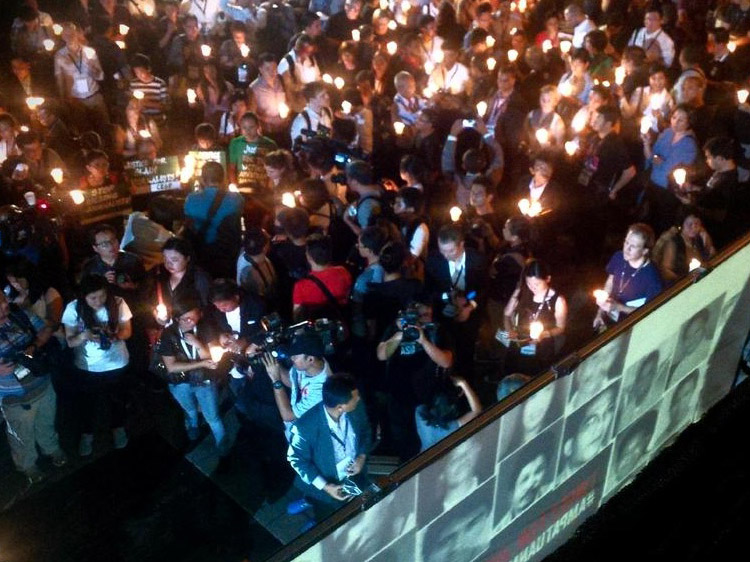
Individuals and media attended the candle vigil in EDSA Shrine in Quezon City, Manila on 23 November 2014 @whoiskarlon, via Twitter
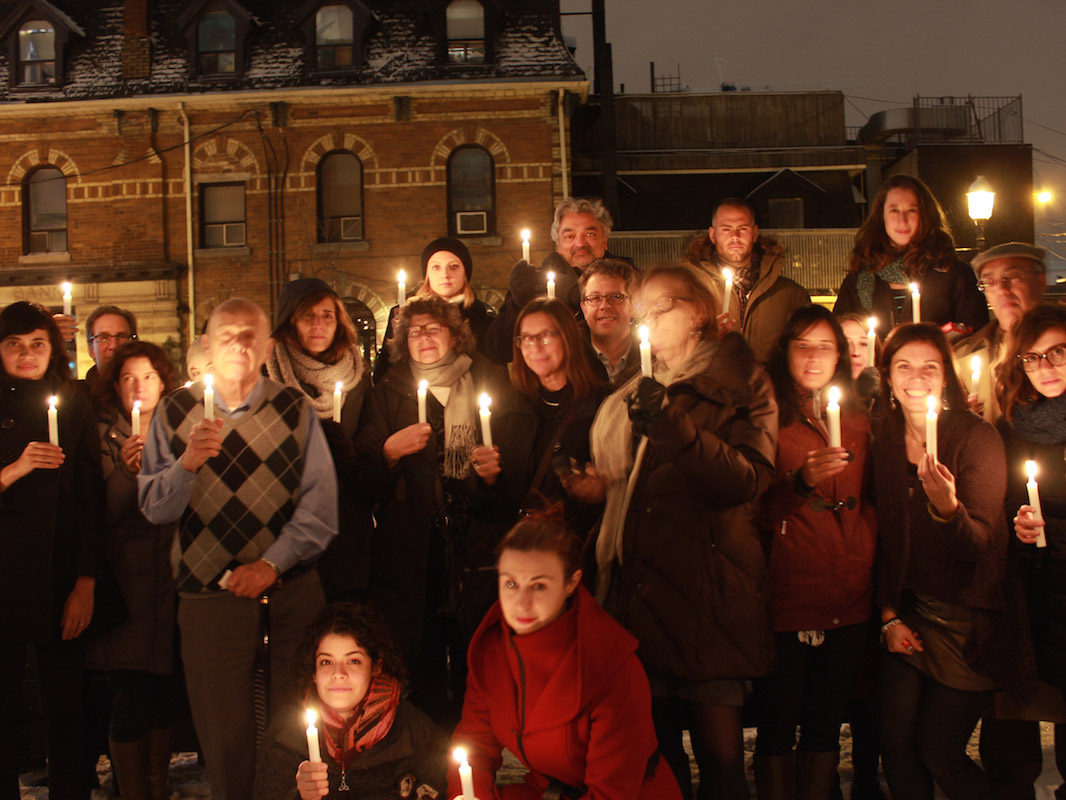
Staff of the IFEX Secretariat gather in Toronto, Canada on the 5th anniversary of the massacre, November 2014Marianna Tzabiras
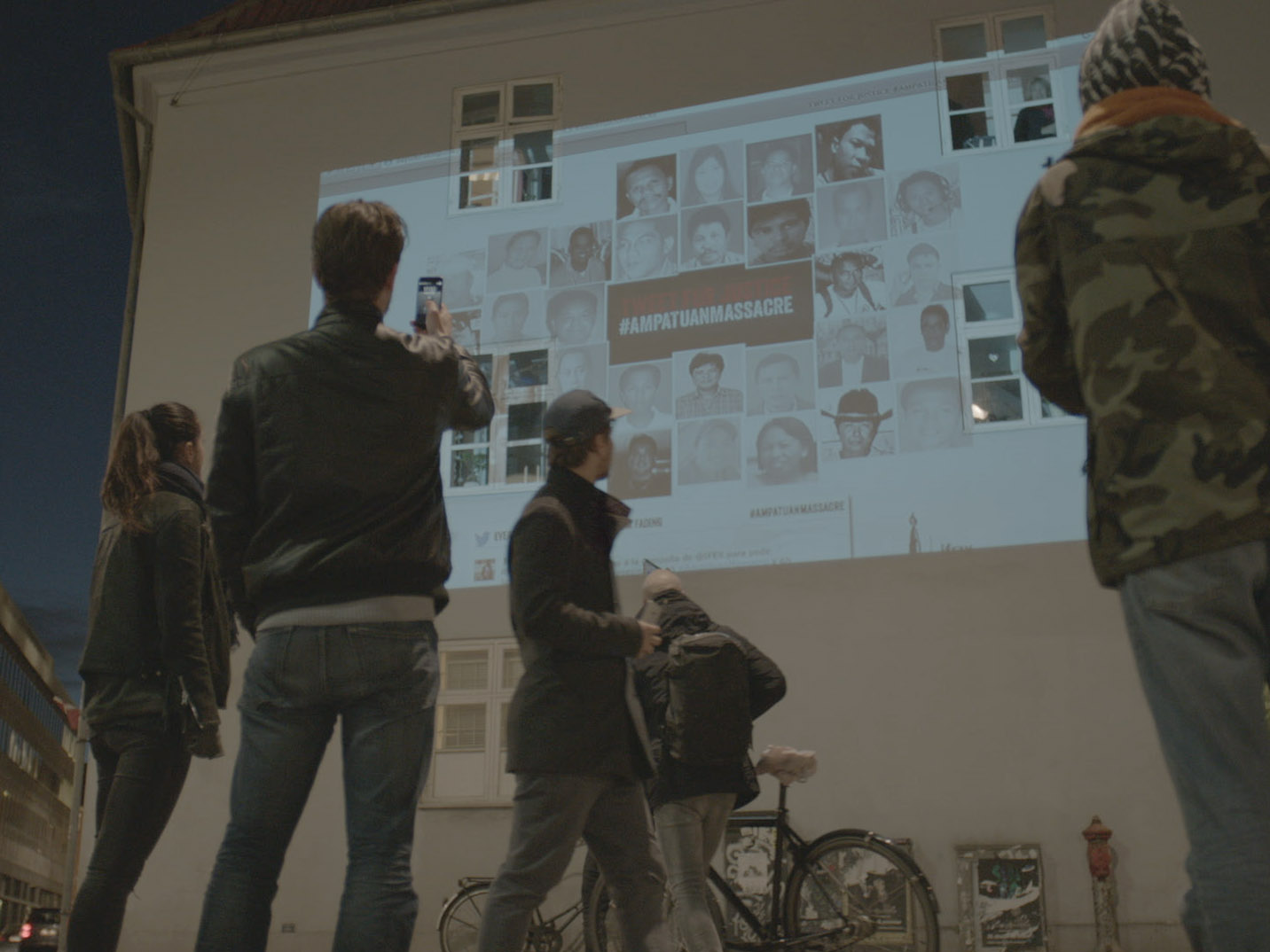
Danish citizens gather in solidarity at the vigil in Copenhagen, 23 November 2014Juniper Park
